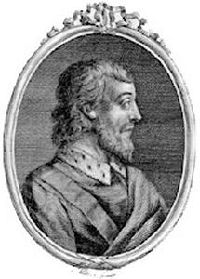Malcolm I of Scotland
| Malcolm I | |
|---|---|

Malcolm I of Scots
|
|
| King of Alba | |
| Reign | 943–954 |
| Predecessor | Constantine II |
| Successor | Indulf |
| Born | c. 895 |
| Died | 954 |
| Issue |
Dub, King of Scots Kenneth II, King of Scots |
| House | Alpin |
| Father | Donald II, King of Scots |
Máel Coluim mac Domnaill (anglicised Malcolm I) (c. 895–954) was king of Scots (before 943 – 954), becoming king when his cousin Causantín mac Áeda abdicated to become a monk. He was the son of Domnall mac Causantín.
Since his father was known to have died in the year 900, Malcolm must have been born no later than 901. By the 940s, he was no longer a young man, and may have become impatient in awaiting the throne. Willingly or not—the 11th-century Prophecy of Berchán, a verse history in the form of a supposed prophecy, states that it was not a voluntary decision that Constantine II abdicated in 943 and entered a monastery, leaving the kingdom to Malcolm.
Seven years later, the Chronicle of the Kings of Alba says:
[Malcolm I] plundered the English as far as the River Tees, and he seized a multitude of people and many herds of cattle: and the Scots called this the raid of Albidosorum, that is, Nainndisi. But others say that Constantine made this raid, asking of the king, Malcolm, that the kingship should be given to him for a week's time, so that he could visit the English. In fact, it was Malcolm who made the raid, but Constantine incited him, as I have said.
Woolf suggests that the association of Constantine with the raid is a late addition, one derived from a now-lost saga or poem.
He died in the shield wall next to his men.
In 945, Edmund I of England, having expelled Amlaíb Cuaran (Olaf Sihtricsson) from Northumbria, devastated Cumbria and blinded two sons of Domnall mac Eógain, king of Strathclyde. It is said that he then "let" or "commended" Strathclyde to Máel Coluim in return for an alliance. What is to be understood by "let" or "commended" is unclear, but it may well mean that Máel Coluim had been the overlord of Strathclyde and that Edmund recognised this while taking lands in southern Cumbria for himself.
...
Wikipedia
